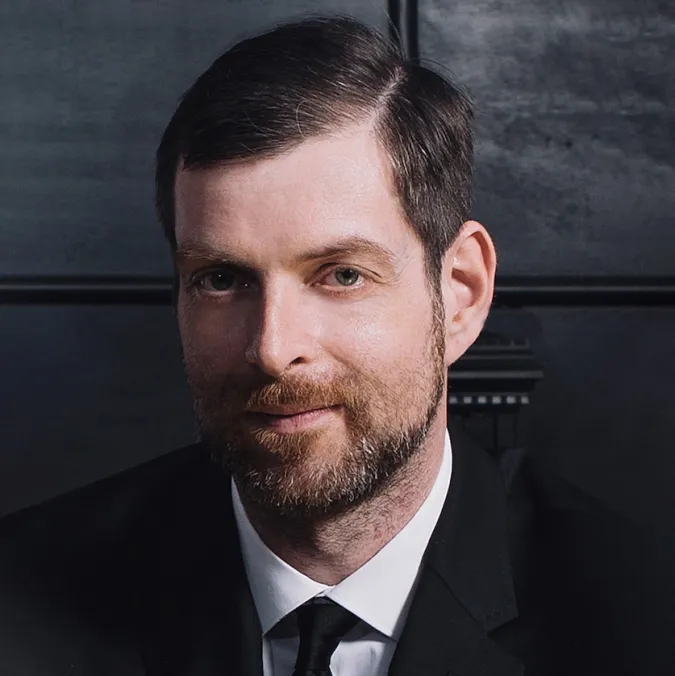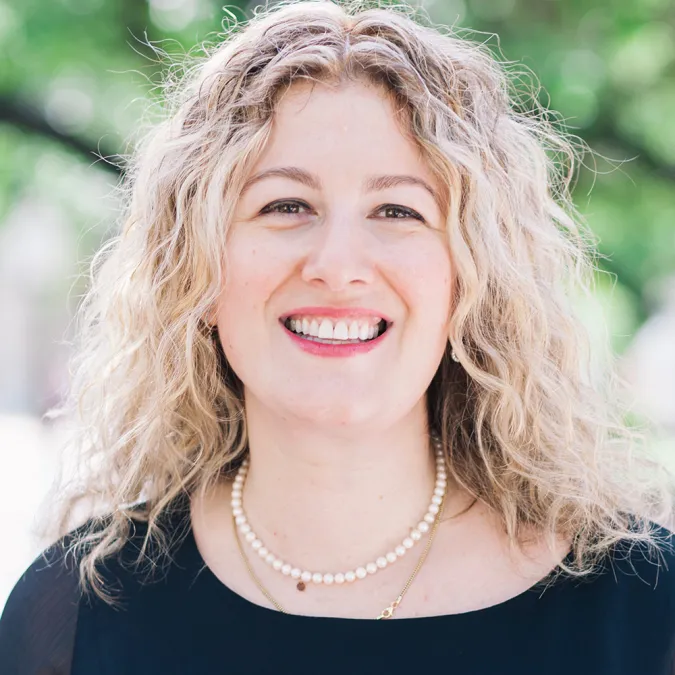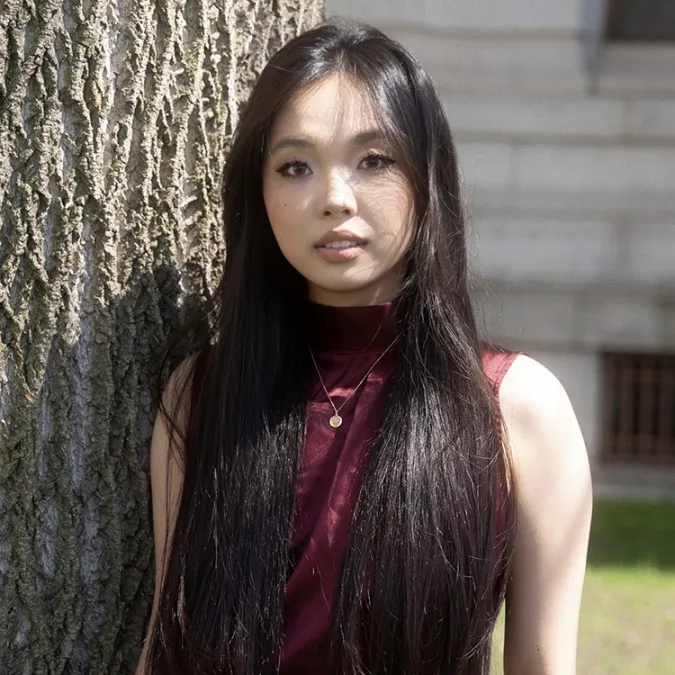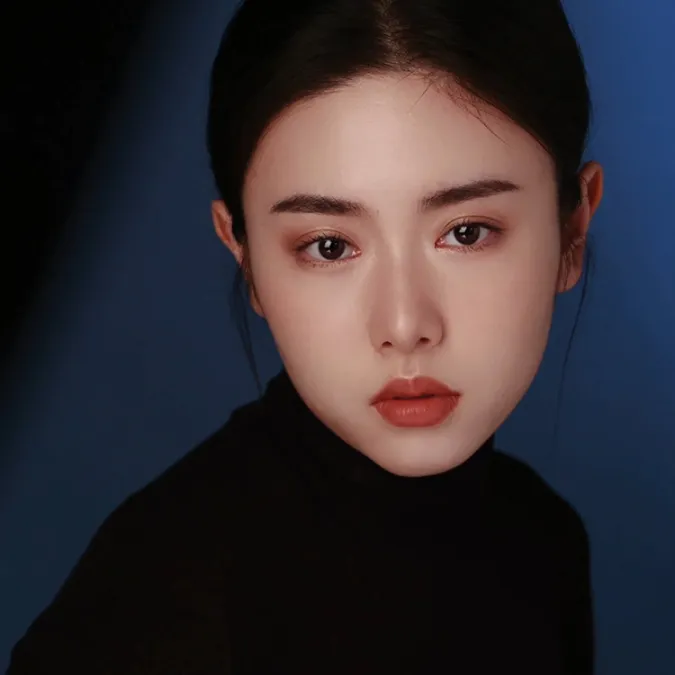
Jinni Shen, soprano
Xijin Chen, soprano
Page Stephens, mezzo soprano
This concert will last about 80 minutes with one intermission.
Please silence your electronic devices.
Photography, video, or recording of any part of this performance is prohibited
Program
Donald Grantham
Romantics:
Johannes Brahms & Clara Schumann
Page Stephens, mezzo soprano
Tamar Sanikidze, piano
Clara Schumann
Sechs Lieder, Op. 13
Ich stand in dunklen Träumen
Sie liebten sich beide, doch keener
Liebeszauber
Der Mond kommt still gegangen
Ich hab’ in deinem Auge
Die stille Lotosblume
Xijin Chen, soprano
Tamar Sanikidze, piano
Johannes Brahms
Zwei Gesänge, Op. 91
Gestillte Sehnsucht
Geistliches Wiegenlied
Page Stephens, mezzo soprano
John Largess, viola
Tamar Sanikidze, piano
intermission
Clara Schumann
Drei Lieder, Op. 12
Er ist gekommen, In Sturm und Regen
Liebst du um Schönheit
Warum willst du and’re fragen?
Jinni Shen, soprano
Tamar Sanikidze, piano
Johannes Brahms
Sonata No. 2 for Viola & Piano
in E-Flat Major, Op. 120
John Largess, viola
Tamar Sanikidze, piano
About the Program
Program notes by Mark Bilyeu
Donald Grantham
Romantics: Johannes Brahms & Clara Schumann
From Love Songs Sweet and Sour
Texts Lisel Mueller
Composed 2020
Duration 7 minutes
Donald Grantham is the recipient of numerous awards and prizes in composition, including the Prix Lili Boulanger, the Nissim/ASCAP Orchestral Composition Prize, First Prize in the Concordia Chamber Symphony's Awards to American Composers, alongside a Guggenheim Fellowship, and three grants from the National Endowment for the Arts. Grantham serves as the Frank C. Erwin, Jr. Centennial Professor of Music at The University of Texas at Austin. Based on Lisel Mueller's tender poem about this relationship, this song employs Brahms' Intermezzo, Op. 117, No. 1 as the accompaniment for the setting of the text.
Clara Schumann
Sech Lieder, Op. 13
Texts Heinrich Heine, Emanuel Geibel, Friedrich Rückert
Born September 13, 1819, Leipzig, Germany
Died May 20, 1896, Frankfurt, Germany
Duration 16 minutes
Clara Schumann is an icon. A pianist of rare virtuosic skill, she battled her father for the life she wanted to lead with the partner she loved, she raised a family, supporting them throughout her husband’s mental illness, and still found the time to compose works which were not just accepted, but celebrated, during her lifetime. Her set of six songs, published as Op. 13 encompass a broad spectrum of emotions, utilizing the texts of Heinrich Heine, Emanuel Geibel, and Friedrich Rückert. The opening song "Ich stand in dunkeln Träumen" was part of a gift to her husband Robert for their first Christmas together, while the following two "Sie liebten sich beide," and "Liebeszauber" were birthday gifts in 1842 and 1843. The set closes with Geibel’s "Die still Lotusblume," which does not offer resolution to the final question posed “can you fathom the song?” The publication was an immediate success. One review wrote the songs were “tender, gracious outpourings of a bounteous heart, quiet and unadorned, but conceived as warmly and sincerely as they are expressed: simply, clearly, unpretentiously,” with another critic saying “The renowned virtuoso offers friends of song a truly welcome gift.”
Johannes Brahms
Zwei Gesänge, Op. 91
Texts Friedrich Rückert, Emanuel Geibel
Born May 7, 1833, Hamburg, Germany
Died April 3, 1897, Vienna, Austria
Composed 1863/1884
Premiered January 30, 1885, Auguste Hohenschild, contralto, Alwin von Beckerath, violist, Johannes Brahms, pianist
Duration 13 minutes
In 1863, Joseph Joachim, world-renowned violinist and long-term collaborator and confidant of Johannes Brahms, married the mezzo soprano Amalie Schneeweiss. Brahms set out to compose a setting of the Christmas-inspired lullaby "Geistliches Wiegenlied" for the occasion, but opted to wait, and sent it to them a year later in celebration of the baptism of their son (who was named after Brahms). Nearly twenty years later, Brahms added a setting of a Friedrich Rückert poem, "Gestillte Sehnsucht," made revisions to the original song, and again sent to the couple—this time in hopes of drawing them closer during a time of marital turmoil. Both songs share the imagery of winds in the trees (how very German), with the first of the set depicting the calm and peace of the rustling, and the second offering a wind that threatens danger for the Christchild. The second song opens with the familiar medieval Christmas carol “Joseph, lieber Joseph mein” in which Mary asks Joseph to help rock their baby. In the score, Brahms wrote the text below the viola line, as a very clear ploy to nab the attention of Joseph Joachim, but did not incorporate the melody—or the text—into the vocal line.
Clara Schumann
Drei Lieder, Op. 12
Text Friedrich Rückert
Born September 13, 1819, Leipzig, Germany
Died May 20, 1896, Frankfurt, Germany
Composed 1840
Duration 7 minutes
Clara Schumann’s compositional output included music for solo piano, small orchestrals works (now lost), chamber music, piano concerti, choral music, and 29 songs. Early in their relationship, Clara and her husband Robert would share poems back and forth in a joint diary, and thus developed a mutual love and appreciation for the poems of Friedrich Rückert, especially his anthology Liebesfrühling which celebrated the joys of love. Robert was first to go about setting these poems to music, and soon had the idea that Clara should also create some songs, writing in their diary ‘The idea of publishing a volume of songs together with Clara inspired me to go to work… now Clara should also compose some songs from the Liebesfrühling. "O, do it, Clärchen!” Clara agreed, and presented Robert with four songs on his 31st birthday. Three of these were selected and published jointly with nine of his own settings (which included two duets penned by Robert). The publisher designated the set Clara’s Op. 12, and Robert’s Op 37. "Er is gekommen in Sturm und Regen" is one of Clara’s most frequently performed songs with driving lines and pianistic virtuosity. "Liebst du um Schönheit" stands as a contrast with it’s serene and content hommage to love, and "Warum willst du and’re fragen" was one of Clara’s favorite songs, appearing on more than ten of her programmes between 1843 and 1882.
Johannes Brahms
Sonata in E-flat major, Op. 120 No. 2
Born May 7, 1833, Hamburg, Germany
Died April 3, 1897, Vienna, Austria
Composed 1894
Premiered January 7, 1895
Duration 22 minutes
In 1890, a 57 year old Johannes Brahms decided to retire, writing to a friend that he “had achieved enough; here I had before me a carefree old age and could enjoy it in peace.” It wasn’t even a year later when, visiting the city of Meininen, he heard a performance of Weber’s Clarinet Concerto No. 1 and the Mozart Clarinet Quintet, that he was inspired to enter back into the workforce and write his own homage to the clarinet. The performer was Richard Mühlfeld (or, as Brahms would later nickname him: “Fräulein Klarinette"). Writing to Clara Schumann, Brahms said “Nobody can blow the clarinet more beautifully than Herr Mühlfeld of this place... he is the Nightingale of the orchestra.” Brahms would write two sonata for clarinet and piano, both dedicated to, and premiered by Mühfeld, first for Duke Georg II of Saxe-Meiningen, then for Clara Schumann, and finally given their public premiere on January 7, 1895. The two sonatas were to be the last chamber works Brahms wrote before his death ten years later. The composer himself made transcriptions for the viola, publishing them simultaneously with the clarinet parts, although he was unsure of their effectiveness, writing he “feared the two pieces are very clumsy and ungratifying as viola sonata.” Brahms, who was a life-long advocate of the viola, made only slight adjustments to better suit the stringed instrument he called “the instrument of the heart.”
About the Artists
John Largess

Violist John Largess began his studies in Boston at age 12 in the public schools, studying with Michael Zaretsky of the Boston Symphony, and later as a student of Michael Tree at the Curtis Institute of Music in Philadelphia. In 1995, he graduated from Yale University to join the Colorado String Quartet as interim violist with whom he toured the United States and Canada teaching and concertizing. The following year he was appointed principal violist of the Charleston Symphony Orchestra in South Carolina, a position he held until joining the Miró Quartet in 1997. With his Bachelor's degree in Classical Archeology from Yale College, and studies at the Hebrew University in Israel, he has participated in excavations in Greece, Israel, and Jordan. John loves to cook gourmet cuisine, particularly French pastry and fine desserts.
Tamar Sanikidze

A “technically nimble and supportive pianist” (The New York Times), Dr. Tamara Sanikidze has performed on the world’s most prestigious stages and serves as the head of voice division, director, producer, and principal coach of the Butler Opera Center and artistic director of the Butler Opera International Competition. As an active recitalist, she partners with Nadine Sierra, Thomas Hampson, Leah Crocetto, Lianna Haroutounian, and Quinn Kelsey. By special invitation, Dr. Sanikidze performed at the White House for President George W. Bush and First Lady Laura Bush. She frequently coaches for the Merola Opera Program, Wolf Trap Opera Center, as well as Young Artist Programs at Washington National Opera, San Francisco Opera, Teatro De’ll Opera di Roma, and Los Angeles Opera. In 2015 she joined the Lehrer Vocal Institute at the Music Academy of the West as Faculty Artist and Audition/Casting judge. Dr. Sanikidze is the recipient of the Marilyn Horne Foundation Award for Excellence in Vocal Accompanying. She holds her Doctor of Musical Arts degree from the University of Maryland, College Park, and is an alumna of the Wolftrap Opera Center, Merola Opera Center, as well as the Music Academy of the West, Aspen Opera Center, Cleveland Art Song Festival, and SongFest.
Page Stephens

Stephens is a mezzo soprano, voice teacher and arts administrator based in Austin, TX with a soft spot for new music. Stephens has performed operas, chamber music, and art song written for her by composers like Matthew Lyons, Thomas B. Yee, Dana Lyn, Adrienne Inglis, Russell Podgorsek, Alex Heppelmann, Keenan Boswell, Steven Serpa, Franklin Piland, Akshaya Avril Tucker, Robbie LaBanca and Adeliia Faizullina. Page recently recorded Mark Kilstofte’s The White Album with pianist Chuck Dillard, after giving the New York premiere of the song cycle with Copland House, the Austin premiere with The Univerity of Texas New Music Ensemble, and the Pacific Northwest premiere with Dillard. During the COVID-19 pandemic in 2020, when live performances were still few and far between, she became a founding member of the new music collective Less Than <10, which streamed concerts of new and reimagined canonic works regularly. Additionally, she helped found a new all-female vocal quintet called VAMP; the quintet gave its premiere performance in Fast Forward Austin’s streamed performance in December, 2020.
Xijin Chen

Xijin Chen is a soprano currently pursuing her doctor of musical arts in opera performance at the Butler School of Music, The University of Texas at Austin, under the guidance of Leah Crocetto. As member of Butler Opera Center, she will perform role of La Contessa in upcoming production of Le nozze di Figaro. This past summer, Xijin showcased her talents as Donna Anna in Chicago Summer Opera's production of Don Giovanni. Ms. Chen holds a master's degree from New England Conservatory of Music, where she was awarded the Dean’s Scholarship. During her time, she performed notable roles including Susanna in Le nozze di Figaro and Giunone in La Calisto. With a passion for both performance and study, Xijin continues to develop her artistry and contribute to the operatic landscape.
Jinni Shen

Jinni Shen, a soprano from Nanjing, China, began her musical training at the age of five. She earned her Bachelor’s degree from the China Conservatory of Music in 2018 before moving to the U.S. to pursue a master’s in voice at Mannes School of Music in New York City. In 2019, Shen performed in Mannes Opera’s Street Scene, and participated in the International Vocal Arts Institute and the Savannah Voice Festival. As a studio artist with Pittsburgh Festival Opera, she performed the role of Min in The Night Flight of Minerva’s Owl and covered Xanthe in Die Liebe der Danae. She earned her doctor of musical arts in opera performance at The University of Texas at Austin in 2024, becoming a member of the Butler Opera Center in 2021. From 2022-2024, she played principal roles including Lisa in The Queen of Spades, Musetta in La Bohème, Giulietta in Les Contes d’Hoffmann, “Ma” Zegner in Proving Up, and Micaëla in Carmen. Shen also performed as Rosalinde in Die Fledermaus at FAVA Opera and apprenticed with OPERA San Antonio.
Upcoming Events

Holiday Concert
Our annual holiday concert returns this year, but expanded!
Our Combined Choirs and Wind Ensemble will anchor the program, but this year they will be joined by other Butler School ensembles and soloists; a collage of sounds for the holiday season!
Saturday, December 7, 7:30 p.m.
Sunday ,December 8, 4:00 p.m.
Bates Recital Hall
Audition Fever &
L'enfant et les sortilèges
Butler Opera Center
December 4 & 5, 7:30 p.m.
McCullough Theatre
Symphony Orchestra
Monday, December 9, 7:30 p.m.
Bates Recital Hall
Miró Quartet
Friday, January 24, 7:30 p.m.
Bates Recital Hall
The Ghosts of Versailles
Butler Opera Center
February 20 & 22, 7:30 p.m.
February 23, 4:00 p.m.
McCullough Theatre
Event Details
$10–20
All University of Texas at Austin students are allowed one free ticket as long as they are available. Student tickets must be picked up at the Box Office with valid student I.D. Seating is unassigned.
If you are a patron with ADA needs, please email tickets@mail.music.utexas.edu and we will reserve ADA seating for you.

